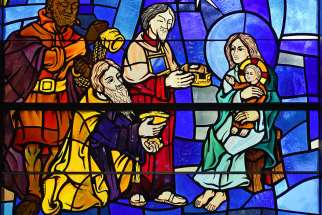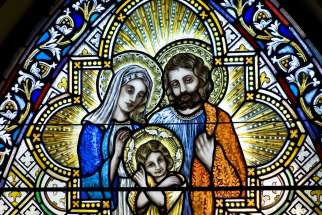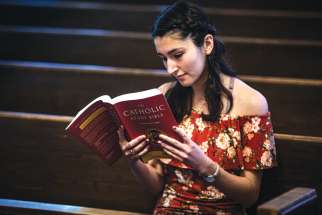God's Word on Sunday: In God’s way, mercy extends to all
Third Sunday in Ordinary Time (Year B) Jan. 24 (Jonah 3:1-5, 10; Psalm 25; 1 Corinthians 7:29-31; Mark 1:14-20)
This very abridged version of the story of Jonah omits some of the most important — and interesting — aspects of his prophetic ministry.
God's Word on Sunday: God’s call goes out to all of us
Second Sunday in Ordinary Time (Year B) Jan. 14 (1 Samuel 3:3b-10, 19; Psalm 40; 1 Corinthians 6:13c-15a, 17-20; John 1:35-42)
The call of God comes to people in many different ways. Just as no two people are alike, no two calls are alike — each one is tailor-made to the individual. We might label Samuel’s prophetic call as the “voice in the middle of the night.” In gratitude for the gift of her child, Samuel’s mother Hannah had given him over to Eli to be raised and formed for service to God. This was long before the building of the permanent temple or the presence of Israelites in Jerusalem.
God's Word on Sunday: Our actions will allow the light to shine
Epiphany of the Lord (Year B) Jan. 7 (Isaiah 60:1-6; Psalm 72; Ephesians 3:2-3a, 5-6; Matthew 2:1-12)
The thick darkness covering the Earth is easy enough to find, but the glorious light requires a bit more searching. In the past year, there has been an abundance of darkness — war, terrorism, mass shootings, corruption and the continual degradation of the environment and climate. Many lives have been lost; many are homeless; and many more are without hope.
God's Word on Sunday: Things will work out on God’s timeline, not ours
Holy Family of Jesus, Mary, and Joseph (Year B) Dec. 31 (Genesis 15:1-6; 17:3b-5, 15-16; 21:1-7; Psalm 105; Hebrews 11:8, 11-12, 17-19; Luke 2:22-40)
Abraham and Sarah had staked their entire lives on God’s promise. They left their native land for a destination unknown. God promised Abraham that in return for his trust and obedience, God would make him the father of a great nation. Having offspring was extremely important in ancient Israel. To die childless was to be snuffed out forever, for one’s name lived on only through descendants.
God's Word on Sunday: The good news is meant for all on Earth
Third Sunday of Advent (Year B) Dec. 17 (Isaiah 61:1-3a, 10-11; Luke 1; 1 Thessalonians 5:16-24; John 1:6-8, 19-28)
What does a message from God sound like? Isaiah sets the tone for the divine revelation and visitation that is repeated by Jesus in the fourth chapter of the Gospel of Luke. A message from God is good news and the source of joy. Good news for whom? For those most in need of it — the poor, the broken-hearted, the downtrodden and for those who are oppressed or lacking freedom. Missing from the list are the high and mighty, the arrogant, the violent and those who perpetrate the injustice and oppression present in our world.
God's Word on Sunday: On our tough road, God is with us
Second Sunday of Advent (Year B) Dec. 10 (Isaiah 40:1-5, 9-11; Psalm 85; 2 Peter 3:8-14; Mark 1:1-8 )
What would “comfort” and “good tidings” sound like in 2023? To whom would they be directed? To be at all meaningful, the message cannot be only for believers and churchgoers. Although originally given to the people of Israel in Babylonian exile, our own times call for a more universal application.
God's Word on Sunday: The divine will show when we’re ready
1st Sunday of Advent (Year B) Dec. 3 (Isaiah 63:16b-17; 6:4-1, 3-8; Psalm 80; 1 Corinthians 1:3-9; Mark 13:33-37
Many people have shared the feelings of frustration, helplessness and deep longing that Isaiah expressed with such poignancy. He lived in a very precarious and insecure world, one that was wracked with violence and rife with corruption. The glory of his nation was a distant memory that was rapidly fading. The people of Israel had just returned from 50 years of exile in Babylon to a devastated Judea and Jerusalem. The temple was in ruins, and the feeble attempts to rebuild it had fallen flat. It was a shadow of its former self. Many of the people lacked the enthusiasm and commitment necessary to restore the nation.
God's Word on Sunday: We will be judged by what we have not done
Christ the King (Year A) Nov. 26 (Ezekiel 34:11-12, 15-17; Psalm 23; 1 Corinthians 15:20-26, 28; Matthew 25:31-46)
As the old saying goes, “If you want the job to be done properly, do it yourself!” In the reading from Ezekiel, God seems to have reached that conclusion.
God's Word on Sunday: Our time on Earth builds toward eternity
33rd Sunday in Ordinary Time (Year A) Nov.19 (Proverbs 31:10-13, 16-18, 29, 26. 28-31; Psalm 128; 1 Thessalonians 5:1-6; Matthew 25:14-30)
The selection from Proverbs concerning the qualities of a perfect wife sounds more like a job description than a love letter. The qualities outlined became the benchmark against which wives were measured. She is a hyper-competent and multi-tasking manager of the household and seems to bear the entire burden without the slightest complaint. One wonders what a hypothetical description of the perfect husband would have contained.
God's Word on Sunday: Fear not, the Lord leaves no one behind
32nd Sunday in Ordinary Time (Year A) Nov. 12 (Wisdom 6:12-16; 1 Thessalonians 4:13-18; Matthew 25:1-13)
Wisdom and knowledge are not identical. A person can have a tremendous amount of knowledge and yet be evil or amoral in their use of it. We see examples of this all around us as scientific knowledge is used to kill and destroy. Humanity is awash in information and facts but they are of little help in facing the challenges of life and the needs of the world.
God's Word on Sunday: The faithful carry the weight to glorify God
31st Sunday in Ordinary Time (Year A) Nov. 5 (Malachi 1:14-2:2. 8-10; Psalm 131; 1Thessalonians 2: 7-9, 13; Matthew 23:1-12)
Why would God be concerned with people giving glory to His name? Does God need any additional glory?
God's Word on Sunday: God demands justice for all, as should we
30th Sunday in Ordinary Time (Year A) Oct. 29 (Exodus 22:21-27; Psalm 18; 1 Thessalonians 1:5c-10; Matthew 22:34-40)
Those who have “made it” in the world often forget their humble origins — in fact, many labour to cover them up. Similarly, immigrant nations sometimes forget their struggles and show little sympathy to new immigrants arriving on their shores. Often those who have suffered injustices visit these same misdeeds on others, forgetting their own experience of pain. Fortunately, some remember their hard upward climb and compassionately extend a helping hand to those struggling along behind them.
God's Word on Sunday: We all have our part in God’s playbook
29th Sunday in Ordinary Time (Year A) Oct. 22 (Isaiah 45:1, 4-6; Psalm 96; 1 Thessalonians 1:1-5ab; Matthew 22:15-21)
As we make our way through the world, it is often difficult to distinguish who the villains and the heroes really are. Appearances often deceive, and Satan can come cloaked in light. Sometimes, however, those whom we initially thought to be covered in darkness reveal a bit of light.
17th Sunday in Ordinary Time (Year A) July 30 (1 Kings 3:5-12; Psalm 119; Romans 8:28-30; Matthew 13:44-52)
What if we were offered the fulfillment of one wish? What would we choose? Our choice would say a lot about us and our values.
Ignorance of the Bible ignores Christ
What are some of your favourite stories from the Bible? The Bible is “inspired by God and is useful for teaching, for reproof, for correction and for training in righteousness.
















